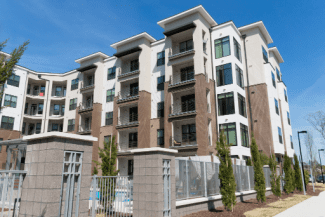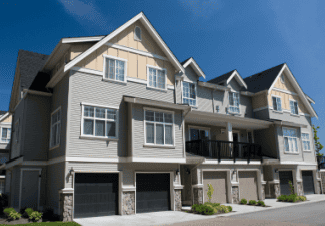How to monitor and maintain a rental property with tenants

The Importance of Monitoring & Maintenance
There are several different ways to invest in real estate, but no matter the investment, monitoring and maintaining it are vital. While many tenants may love a “hands-off” landlord, many things can go wrong if you don’t stay on top of monitoring and maintenance. Failing to maintain your rental property is among the top reasons many tenants decide not to renew a lease. Here are some reasons why good maintenance and monitoring are so crucial.
- Regular maintenance keeps your property safe, and it also helps it to maintain its value.
- Good maintenance may lead to lower utility bills, which results in happier tenants (and landlords).
- Failure to monitor and maintain your property can lead to costly repairs later and affect your total ROI (return on investment).
- Taking good care of your townhome, condo, or apartment fosters a better relationship between yourself and your tenants.
- Performing timely repairs isn’t just smart for a property owner but also the law in most states.
- Keeping your property safe, clean, and sanitary can help prevent issues like pest infestations, saving you money over the long term.
- Some tenants may choose to pay for repairs themselves if they don’t get a fast response, and they may then deduct the out-of-pocket cost from their monthly rent payment.
Stay on a Maintenance Schedule
Performing routine and regular maintenance isn’t just essential to keep your tenants happy and protects your investment. Taking good care of your property will attract high-quality tenants and ensure that it’s attractive to future renters. Come up with a plan and a schedule, then stick to it when it comes to routine maintenance tasks. Determine which tasks should be done regularly and how often, and at what times of the year they should be completed. For example, you should change the HVAC filter for your property once a month and schedule pest exterminations at least once per year.
Create a property preventative maintenance checklist so you don’t forget which items still need to be completed. Include the property address (if you have more than one), the tenant’s name, and the date when each item is checked off your list. Do a walk-through and look for issues like loose or missing caulk and grout, signs of drafts or water leaks near windows and doors, and problems with the paint, ceiling, or drywall. If you rent a home, remember to inspect the roof and gutters at least once yearly. Flush the water heater and check all fire and smoke detectors to ensure they’re in good working order.
Inspections: Formal & Informal, Scheduled & Impromptu
As a property owner, performing regular inspections of your home or condo is vital. Routine inspections will confirm that your property is in good condition and ensure that your tenants are following the terms of their lease. You can do several types of inspections: move-in and move-out inspections are standard, as are occasional impromptu drive-by and walk-through inspections with your tenants present. If you decide to do a casual, impromptu inspection, confirm it with your tenant and ensure they will be there. However, they do not need to be present if you want to drive by your property.
Provide your tenants with a move-in checklist before they move into the property so they can inform you of any issues that need to be addressed. When your tenants move out, a separate move-out checklist and inspection should be provided. This inspection will help to ensure that everything is still in good condition, and whether or not money will need to be deducted from the tenant’s deposit to pay for any damages.
It’s also a good idea to inspect your property occasionally when it’s occupied. This will help identify issues that need to be addressed, and it can also help to improve the relationship with your tenants since they’ll know they have a landlord who cares about the property they live in.
Strictly Business
Remember that renting property is a way of doing business, so it’s crucial to remain firm yet fair with your tenants. Try to keep things as business oriented as possible without involving any personal commentary. Use property maintenance software that helps you keep track of costs and maintenance schedules. This software will also help you with record keeping when you need to file taxes or submit information to your accountant. The software should also include the ability to upload photos and videos in case you need to refer to them later.
Evicting a tenant is never something that most landlords want to do, but unfortunately, it must be done in certain circumstances. Nonpayment of rent and illegal activity are two of the most common eviction causes. Always ensure that you’re following the letter of the law and that you stick to the proper eviction procedures per the rules of your state, city, or county. Do every bit of communication between yourself and your tenants in writing, so you always have a record of what transpires. Since renting property to tenants is a business, you must try to be as firm as possible regarding the rules.
Don’t Be a Hero
Trying to do some DIY repair and improvement tasks is excellent and can save you quite a bit of money. However, you must be aware of your limitations regarding home improvement. Always hire professionals when needed, including expert electricians and plumbers. Not only will this ensure that the repairs to your property are being done correctly, but some warranty on the labor should also protect you if anything goes wrong. It also shows your tenants that you’re serious about ensuring their home is safe and taken care of the way it should be.
Small tasks like touching up paint or replacing caulk are things most landlords can do themselves. Cleaning the home, cutting the grass, and checking or replacing appliances are also things that most property owners can handle themselves. However, it’s always best to find a reputable and reliable contractor you can count on for significant issues and repairs. You can also hire a property management company to handle the heavy lifting. Don’t be a hero; instead, turn to the experts so you and your tenants will have peace of mind.
Maintenance and Monitoring Matters
Remember these tips to ensure that you monitor and maintain your rental property correctly. With some simple procedures in place and regular inspections, you can take good care of your investment while keeping your tenants safe and happy.















 Accessibility
Accessibility